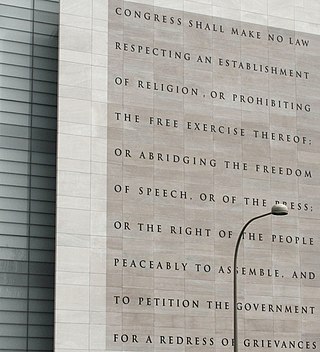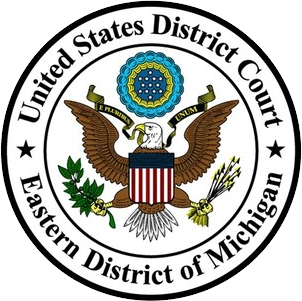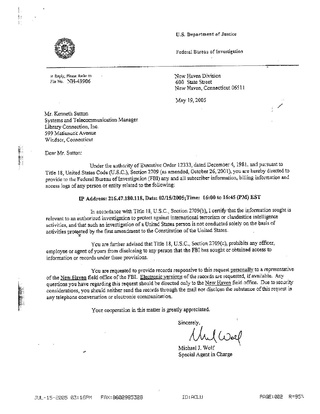
John Doe (male) and Jane Doe (female) are multiple-use placeholder names that are used in the United States and the United Kingdom when the true name of a person is unknown or is being intentionally concealed. In the context of law enforcement in the United States, such names are often used to refer to a corpse whose identity is unknown or cannot be confirmed. These names are also often used to refer to a hypothetical "everyman" in other contexts, like John Q. Public or "Joe Public". There are many variants to the above names, including John/Jane Roe, John/Jane Smith, John/Jane Bloggs, and Johnie/Janie Doe or just Baby Doe for children.
Milliken v. Bradley, 418 U.S. 717 (1974), was a significant United States Supreme Court case dealing with the planned desegregation busing of public school students across district lines among 53 school districts in metropolitan Detroit. It concerned the plans to integrate public schools in the United States following the Brown v. Board of Education (1954) decision.

In the United States, freedom of speech and expression is strongly protected from government restrictions by the First Amendment to the U.S. Constitution, many state constitutions, and state and federal laws. Freedom of speech, also called free speech, means the free and public expression of opinions without censorship, interference and restraint by the government. The term "freedom of speech" embedded in the First Amendment encompasses the decision what to say as well as what not to say. The Supreme Court of the United States has recognized several categories of speech that are given lesser or no protection by the First Amendment and has recognized that governments may enact reasonable time, place, or manner restrictions on speech. The First Amendment's constitutional right of free speech, which is applicable to state and local governments under the incorporation doctrine, prevents only government restrictions on speech, not restrictions imposed by private individuals or businesses unless they are acting on behalf of the government. However, It can be restricted by time, place and manner in limited circumstances. Some laws may restrict the ability of private businesses and individuals from restricting the speech of others, such as employment laws that restrict employers' ability to prevent employees from disclosing their salary to coworkers or attempting to organize a labor union.
Doe v. Bolton, 410 U.S. 179 (1973), was a decision of the Supreme Court of the United States overturning the abortion law of Georgia. The Supreme Court's decision was released on January 22, 1973, the same day as the decision in the better-known case of Roe v. Wade.

Dean v. Utica Community Schools, 345 F. Supp. 2d 799, is a landmark legal case in United States constitutional law, namely on how the First Amendment applies to censorship in a public school environment. The case expanded on the ruling definitions of the Supreme Court case Hazelwood School District v. Kuhlmeier, in which a high school journalism-oriented trial on censorship limited the First Amendment right to freedom of expression in curricular student newspapers. The case consisted of Utica High School Principal Richard Machesky ordering the deletion of an article in the Arrow, the high school's newspaper, a decision later deemed "unreasonable" and "unconstitutional" by District Judge Arthur Tarnow.

United States v. Alkhabaz, 104 F.3d 1492 was a case brought against University of Michigan undergraduate Abraham Jacob Alkhabaz, a.k.a. Jake Baker, related to several incidents regarding snuff stories that he wrote while he was a student at the University of Michigan. Alkhabaz was charged with violation of 18 U.S.C. s 875(c), communicating via interstate or foreign commerce threats to kidnap or injure another person. The case raised immediate First Amendment concerns and is considered an important one in the history of cyber law.
A speech code is any rule or regulation that limits, restricts, or bans speech beyond the strict legal limitations upon freedom of speech or press found in the legal definitions of harassment, slander, libel, and fighting words. Such codes are common in the workplace, in universities, and in private organizations. The term may be applied to regulations that do not explicitly prohibit particular words or sentences. Speech codes are often applied for the purpose of suppressing hate speech or forms of social discourse thought to be disagreeable to the implementers.
National Socialist Party of America v. Village of Skokie, 432 U.S. 43 (1977), arising out of what is sometimes referred to as the Skokie Affair, was a landmark decision of the US Supreme Court dealing with freedom of speech and freedom of assembly. This case is considered a "classic" free speech case in constitutional law classes. Related court decisions are captioned Skokie v. NSPA, Collin v. Smith, and Smith v. Collin. The Supreme Court ruled 5–4, per curiam. The Supreme Court's 1977 ruling granted certiorari and reversed and remanded the Illinois Supreme Court's denial to lift the lower court's injunction on the NSPA's march. In other words: the courts decided a person's assertion that speech is being restrained must be reviewed immediately by the judiciary. By requiring the state court to consider the neo-Nazis' appeal without delay, the U.S. Supreme Court decision opened the door to allowing the National Socialist Party of America to march.

Avern Levin Cohn was a United States district judge of the United States District Court for the Eastern District of Michigan.
Planned Parenthood of Central Missouri v. Danforth, 428 U.S. 52 (1976), is a United States Supreme Court case on abortion. The plaintiffs challenged the constitutionality of a Missouri statute regulating abortion. The Court upheld the right to have an abortion, declaring unconstitutional the statute's requirement of prior written consent from a parent or a spouse.

John Doe v. Alberto R. Gonzales was a case in which the American Civil Liberties Union (ACLU), Library Connection, and several then-pseudonymous librarians, challenged Section 2709 of the Patriot Act; it was consolidated on appeal with a separate case, Doe v. Ashcroft.

Parks v. LaFace Records, 329 F.3d 437, was a lawsuit filed by attorney Gregory J Reed in March 1999 on Rosa Parks' behalf against American hip-hop duo Outkast and LaFace Records, claiming that the group had illegally used Parks' name without her permission for the song "Rosa Parks", the most successful radio single of Outkast's 1998 album Aquemini. The song's chorus, which Parks' legal defense felt was disrespectful to her, is as follows: "Ah ha, hush that fuss / Everybody move to the back of the bus / Do you want to bump and slump with us / We the type of people make the club get crunk."
Thomas Lamson Ludington is a United States district judge of the United States District Court for the Eastern District of Michigan. Although the Eastern District of Michigan's other 14 judges cover the Southern Division, Ludington is the only judge for the entire Northern Division, which covers nearly a quarter of Michigan's land mass.
A Doe subpoena is a subpoena that seeks the identity of an unknown defendant to a lawsuit. Most jurisdictions permit a plaintiff who does not yet know a defendant's identity to file suit against John Doe and then use the tools of the discovery process to seek the defendant's true name. A Doe subpoena is often served on an online service provider or ISP for the purpose of identifying the author of an anonymous post.
The issue of school speech or curricular speech as it relates to the First Amendment to the United States Constitution has been the center of controversy and litigation since the mid-20th century. The First Amendment's guarantee of freedom of speech applies to students in the public schools. In the landmark decision Tinker v. Des Moines Independent Community School District, the U.S. Supreme Court formally recognized that students do not "shed their constitutional rights to freedom of speech or expression at the schoolhouse gate".
Doe v. Reed, 561 U.S. 186 (2010), is a United States Supreme Court case which holds that the disclosure of signatures on a referendum does not violate the Petition Clause of the First Amendment to the United States Constitution.
United States v. Kirschner, 823 F. Supp. 2d 665, was a federal criminal case in Michigan. The defendant had previously been indicted by a grand jury under three counts of receipt of child pornography under 18 U.S.C. § 2252A(a)(2)(A). The government sought to use a grand jury subpoena post-indictment to acquire additional evidence: the contents of an encrypted file from the defendant's hard drive.

The Copyright Remedy Clarification Act (CRCA) is a United States copyright law that attempted to abrogate sovereign immunity of states for copyright infringement. The CRCA amended 17 USC 511(a):
In general. Any State, any instrumentality of a State, and any officer or employee of a State or instrumentality of a State acting in his or her official capacity, shall not be immune, under the Eleventh Amendment of the Constitution of the United States or under any other doctrine of sovereign immunity, from suit in Federal Court by any person, including any governmental or nongovernmental entity, for a violation of any of the exclusive rights of a copyright owner provided by sections 106 through 122, for importing copies of phonorecords in violation of section 602, or for any other violation under this title.
Hate speech in the United States cannot be directly regulated by the government due to the fundamental right to freedom of speech protected by the Constitution. While "hate speech" is not a legal term in the United States, the U.S. Supreme Court has repeatedly ruled that most of what would qualify as hate speech in other western countries is legally protected speech under the First Amendment. In a Supreme Court case on the issue, Matal v. Tam (2017), the justices unanimously reaffirmed that there is effectively no "hate speech" exception to the free speech rights protected by the First Amendment and that the U.S. government may not discriminate against speech on the basis of the speaker's viewpoint.
Mahanoy Area School District v. B.L., 594 U.S. ___ (2021), was a United States Supreme Court case involving the ability of schools to regulate student speech made off-campus, including speech made on social media. The case challenged past interpretations of Tinker v. Des Moines Independent Community School District and Bethel School District v. Fraser in light of online communications.







